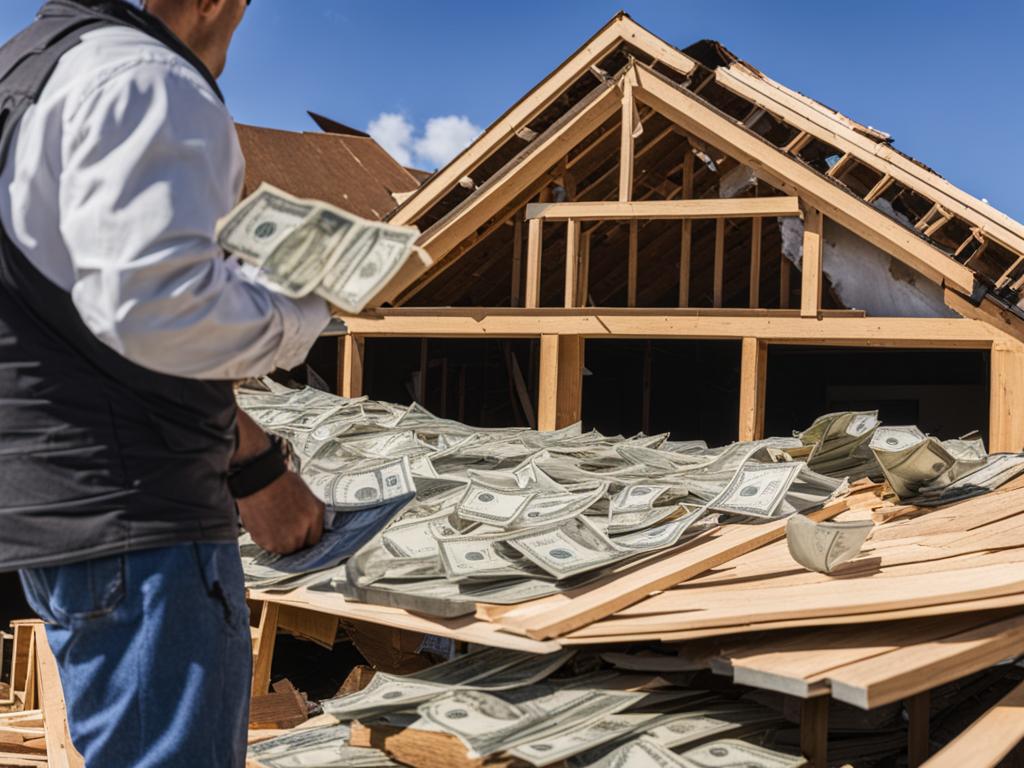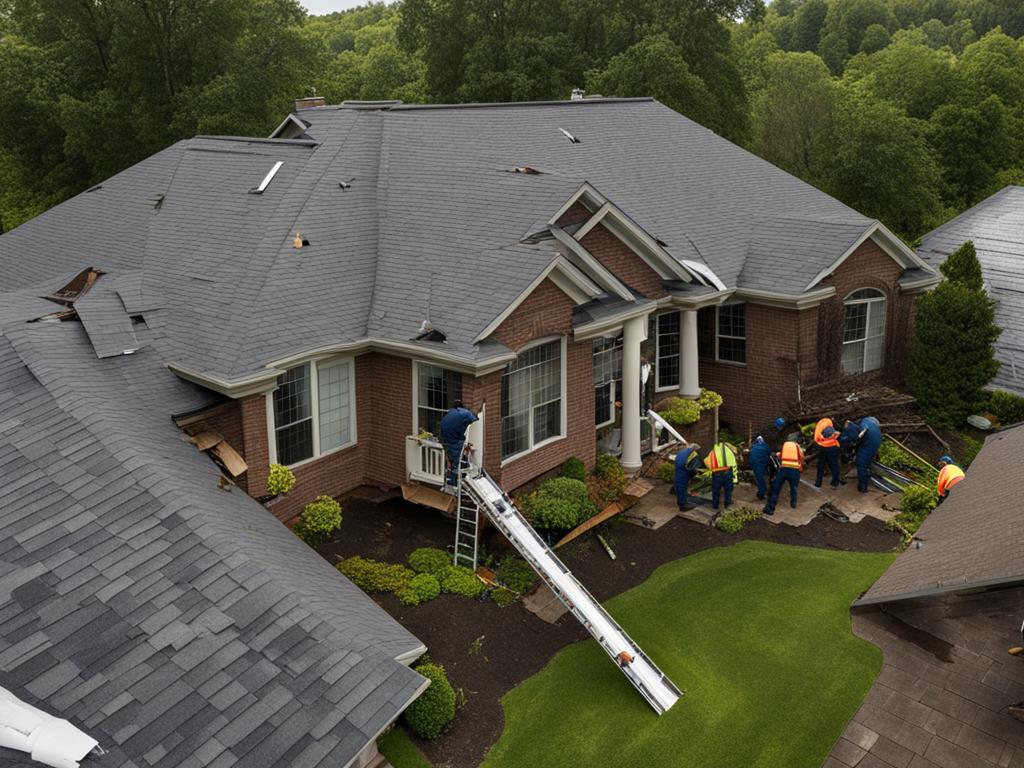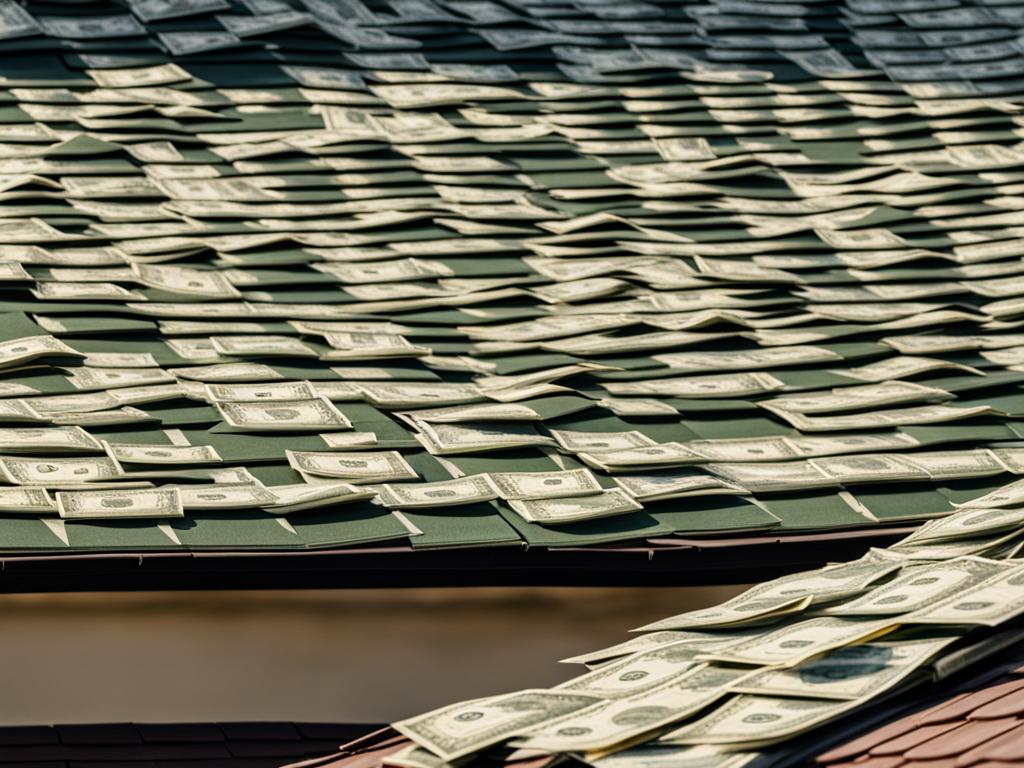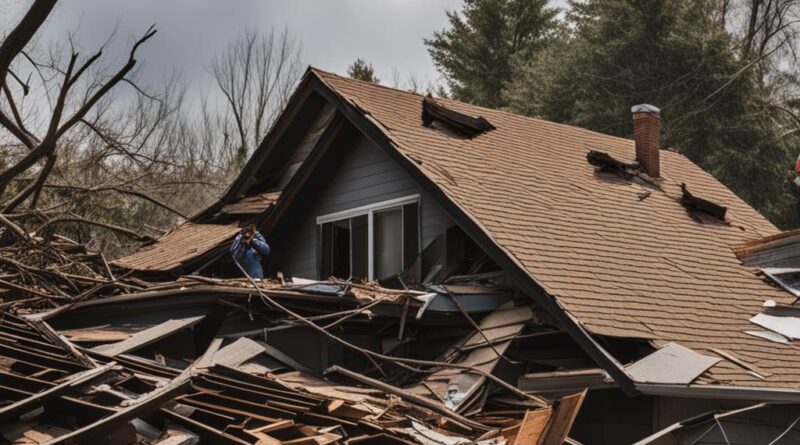Understanding If You Can Keep Insurance Money for Roof
When it comes to roof repairs, one of the common questions homeowners have is whether they can keep the insurance money received for the damages. The answer is yes, but there are important factors to consider before making any decisions. From mortgage company involvement to legal requirements and safety concerns, understanding the ins and outs of keeping insurance money for roof repairs is crucial.
In this article, we will delve into the various aspects that affect your ability to keep the insurance money for roof repairs. We will explore the role of mortgage companies, legal considerations for permits, safety and skill requirements for repair work, financial implications, insurance company payouts, the involvement of contractors and professionals, factors affecting the amount of insurance payout, and what to do with any leftover insurance money.
Key Takeaways:
- Homeowners can generally keep insurance money received for roof repairs, but certain factors may influence its usage.
- Mortgage companies may have a say in how the insurance money is used and may impose restrictions or supervision.
- Legal requirements and permits may be necessary for roof repairs, depending on the severity and local regulations.
- Assessing the safety risks and required skills for roof repairs is essential to determine whether professional help is needed.
- Financial considerations such as repair costs, insurance coverage, and time investment should be weighed before deciding on DIY repairs.
Understanding the Role of Mortgage Companies in Roof Insurance Claims
If you have a mortgage on your home, it’s important to understand the role that your mortgage company plays in the insurance claim settlement for roof repairs. The involvement and supervision of the mortgage company can vary depending on the severity and complexity of the damage, as well as your mortgage balance.
When you file an insurance claim for roof repairs, your mortgage company is typically listed as a payee on the settlement check. This means that they have a financial interest in the property and may have specific policies in place regarding how the insurance funds are used. It’s essential to check with your mortgage company to understand their requirements and whether they will allow you to handle the repairs yourself.
In some cases, mortgage companies may require approval for any home repairs, including roof repairs. This means that you would need to provide documentation such as repair estimates, contractor information, and proof of completion to the mortgage company for their review and approval. They may also have restrictions on self-repairs and require the use of licensed contractors. It’s important to follow the guidelines set by your mortgage company to avoid any potential issues or conflicts.
By understanding the role of your mortgage company in the insurance claim process, you can navigate the requirements and ensure that the necessary repairs are completed in compliance with their policies.
Table: Comparison of Mortgage Company Involvement in Roof Insurance Claims
| Factor | Low Involvement | High Involvement |
|---|---|---|
| Severity of Damage | Minor repairs | Major repairs or full roof replacement |
| Mortgage Balance | Low mortgage balance | High mortgage balance |
| Self-Repair Restrictions | May allow self-repairs | May require licensed contractors |
| Approval Process | Minimal documentation required | Detailed estimates, contractor information, and proof of completion may be needed |
Table: Comparison of Mortgage Company Involvement in Roof Insurance Claims
Legal Considerations for Roof Repairs and Permits
When it comes to repairing your roof, it’s important to consider the legal requirements and permits that may be necessary. Depending on the severity of the damage and the regulations in your city or town, you may need to obtain specific permits or licenses before proceeding with the repairs. These requirements are in place to ensure that the repairs are done safely and meet the necessary standards.
In addition to permits, certain types of work, such as electrical repairs, may require a licensed professional. It’s essential to comply with these requirements to avoid any potential legal issues or safety hazards. Failure to obtain the proper permits or licenses could result in fines or penalties, and your insurance coverage for future repairs may be affected.
To determine the specific legal requirements and permits needed for your roof repairs, it’s recommended to check with your local building department or development authority. They will be able to provide you with the necessary information and guide you through the process.

Table: Common Legal Considerations for Roof Repairs
| Legal Considerations | Description |
|---|---|
| Permits | Obtaining the necessary permits and licenses for roof repairs |
| City Regulations | Complying with local regulations and building codes |
| Licenses | Ensuring the use of licensed professionals for specific types of repairs |
| Electrical Work | Hiring licensed electricians for electrical repairs |
| Building Department Requirements | Meeting the requirements set by the local building department |
By understanding and complying with the legal considerations for roof repairs, you can ensure that the repairs are done safely and in accordance with the regulations in your area.
Safety Considerations and Professional Skills for Roof Repairs
When it comes to repairing your roof, there are important safety considerations to keep in mind. Roof work can be dangerous, especially if you’re not familiar with the necessary precautions and techniques. It’s crucial to prioritize your safety and the safety of others when working on the roof.
If you’re considering DIY repairs, it’s important to assess your own skills and capabilities. Roof repairs require specific knowledge and expertise, especially when it comes to more complex aspects such as electrical work. It’s generally recommended to leave these tasks to trained professionals who have the necessary skills and experience. Hiring a professional ensures that the repairs are done correctly and reduces the risk of accidents or further damage.
Obtaining permits for electrical work is another important consideration. Depending on your location and the specific repairs needed, permits may be required to ensure compliance with local regulations and safety standards. Consulting with a licensed professional can help you navigate the permit process and ensure that the necessary inspections and approvals are obtained.
“When it comes to roof repairs, safety should always be the top priority. Hiring a professional contractor ensures that the repairs are done correctly and minimizes the risks involved. Additionally, obtaining the necessary permits and following local regulations helps ensure that the repairs meet professional standards and comply with safety requirements.”
Table: Comparison of DIY Repairs and Professional Roof Repairs
| DIY Repairs | Professional Roof Repairs | |
|---|---|---|
| Safety | Risks of accidents or injuries due to lack of experience | Trained professionals prioritize safety and have the necessary equipment and knowledge |
| Skills | Dependent on the homeowner’s abilities and knowledge | Professionals have specific skills and experience for quality repairs |
| Permits | Homeowner is responsible for obtaining necessary permits | Professionals handle the permit process and ensure compliance |
| Quality | Repairs may not meet professional standards | Professionals ensure quality repairs that meet industry standards |
By considering the safety implications, your own skills, and the need for permits, you can make an informed decision about whether to undertake DIY repairs or hire a professional for your roof repairs. Prioritizing safety and ensuring that repairs meet professional standards will help protect your home and prevent further damage.
Financial Considerations for Repairing Your Roof
When it comes to repairing your roof, there are several financial considerations that you need to keep in mind. Understanding the cost of roof repairs, insurance coverage for repairs, and the potential cost savings of DIY repairs can help you make an informed decision.
The cost of roof repairs can vary depending on the extent of the damage and the materials needed. Hiring a professional contractor to assess the damage and provide a repair estimate can give you an accurate idea of the costs involved. It’s important to factor in not only the materials and labor but also any additional expenses such as permits or licensing fees.
Insurance coverage for roof repairs can depend on your specific policy. Review your homeowner’s insurance policy to understand what repairs are covered and what deductible you need to meet. It’s important to consult with your insurance company to ensure that the repairs are eligible for reimbursement.

DIY repairs can appear to be a cost-saving option, but it’s crucial to consider your own skills and capabilities. While labor costs may be saved, there is a risk of improper repairs or potential safety hazards. Additionally, attempting DIY repairs without proper permits or licenses may affect future insurance coverage.
| Professional Repair Estimates | Cost Savings of DIY Repairs |
|---|---|
| Obtaining professional repair estimates can help you budget for the necessary repairs and ensure that the work is done to professional standards. | DIY repairs can save on labor costs, but it’s important to consider the potential risks and safety concerns. |
| Professional contractors have the skills and experience to assess the extent of the damage and provide accurate repair estimates. | Researching and understanding the scope of the repairs needed can help you determine if they are within your capabilities. |
| Having a professional estimate can also help if you need to negotiate with your insurance company for a higher claim payout. | Consider the time and effort required for DIY repairs and weigh them against the potential cost savings. |
Consulting with a professional contractor and your insurance company can provide valuable insights and guidance when it comes to the financial considerations of repairing your roof.
Key Takeaways:
- Understanding the cost of roof repairs is essential to budgeting for the necessary repairs and determining the most cost-effective approach.
- Insurance coverage for roof repairs varies depending on your policy and deductible. Consult with your insurance company to ensure that the repairs are eligible for reimbursement.
- Consider the potential cost savings of DIY repairs, but be mindful of the risks and safety concerns involved. Ensure proper permits and licenses if attempting DIY repairs.
- Obtaining professional repair estimates can help you negotiate with your insurance company for a higher claim payout and ensure that the repairs meet professional standards.
Understanding How Insurance Companies Determine Payouts for Roof Repairs
When it comes to filing an insurance claim for roof repairs, it’s important to understand how insurance companies determine the payouts. The process typically starts with a claims adjuster who assesses the damage and creates an estimate for the repairs. The insurance company will then base the payout on either the actual cash value (ACV) or the replacement cost value (RCV) of the damaged item.
The actual cash value takes into account the depreciation of the roof and considers its age, condition, and wear and tear. On the other hand, the replacement cost value covers the full cost of repairing or replacing the damaged roof without factoring in depreciation. The insurance company may also consider labor and material cost estimates provided by contractors to calculate the payout.
Once the repairs are completed, you may need to provide a completion certificate to the insurance company as proof that the work has been done. This helps ensure that the payout is accurately calculated and allows for any necessary adjustments to be made. Additionally, some insurance policies may include the concept of recoverable depreciation, which means you may be able to receive additional funds if the final repair costs exceed the initial estimate.
| Term | Definition |
|---|---|
| Actual Cash Value (ACV) | The value of the damaged roof, taking into account depreciation and wear and tear. |
| Replacement Cost Value (RCV) | The cost of repairing or replacing the damaged roof without factoring in depreciation. |
| Labor and Material Cost Estimates | Estimates provided by contractors for the cost of labor and materials required for the repairs. |
| Completion Certificate | A document provided to the insurance company as proof that the roof repairs have been completed. |
| Recoverable Depreciation | The potential for additional funds if the final repair costs exceed the initial estimate. |
Understanding how insurance companies determine payouts for roof repairs can empower you as a homeowner during the claims process. It’s important to keep clear records, gather accurate estimates, and provide all necessary documentation to ensure a fair and accurate payout. Consulting with a professional contractor or a home insurance attorney can also provide valuable guidance and support throughout the process.

“The insurance claims process for roof repairs typically involves a damage assessment by a claims adjuster, who will create an estimate for the repairs.”
The Role of Contractors and Professionals in Roof Repairs
When it comes to repairing your roof, hiring a professional contractor can provide numerous advantages. One of the primary benefits is that a professional contractor can provide you with accurate repair estimates. This is crucial when dealing with insurance companies, as having detailed estimates can help you negotiate for a fair insurance claim payout. Professional repair estimates can also serve as evidence of the extent of the damage, which can be useful if there is any dispute with the insurance company.
In addition to providing accurate estimates, professional contractors can negotiate with your insurance company on your behalf. They have experience in dealing with insurance claims and understand the nuances of the process. By hiring a professional, you can ensure that your interests are represented throughout the claims process and improve your chances of receiving a higher claim payment.
Furthermore, professional contractors can ensure that the repairs meet the required professional standards. This is essential to ensure the longevity and safety of your roof. By hiring a contractor with the necessary expertise and certifications, you can have peace of mind knowing that the repairs are being carried out correctly. Moreover, professional contractors often have established relationships with suppliers, which can result in cost savings for materials and expedited repair timelines.
Increasing Your Insurance Claim Payment
If you want to maximize your insurance claim payment, hiring a property damage attorney can be beneficial. These attorneys specialize in advocating for homeowners in insurance claims disputes. They can assess the extent of the damage and hire experts for property inspection to provide a comprehensive evaluation. With their expertise, they can negotiate with the insurance company to ensure that you receive fair compensation for the repairs.

It’s important to note that hiring a property damage attorney should be considered when there are significant disputes or issues with the insurance claim process. They can provide valuable guidance and legal representation to ensure that your rights as a homeowner are protected.
Factors Affecting the Amount of Insurance Payout for Roof Repairs
When it comes to insurance payouts for roof repairs, several factors can influence the final amount you receive. Insurance companies consider various elements in their calculations, including oversight, repair costs, administrative costs, repair complexity, professional rates for labor, and oversight for major repairs.
To accurately determine the insurance payout, insurance companies may exercise oversight throughout the repair process. This can involve reviewing repair estimates, monitoring the use of funds, and ensuring that the repairs meet professional standards. The level of oversight may vary depending on the extent and complexity of the repairs.
The cost of professional repairs is another significant factor that affects the insurance payout. Insurance companies typically consider the estimated costs provided by contractors or repair professionals. These costs may include both labor and material expenses. It is essential to obtain detailed repair estimates to support your insurance claim and ensure a fair payout.
Administrative costs, such as permits and licenses, may also impact the final insurance payout. Depending on the jurisdiction and the specific repair requirements, you may need to obtain permits or licenses, which can add to the overall cost. It’s crucial to factor in these administrative expenses when determining the amount you will receive from your insurance company.
| Factors Affecting Insurance Payout for Roof Repairs | Impact on Insurance Payout |
|---|---|
| Oversight | May vary depending on repair complexity |
| Repair Costs | Based on professional labor and material estimates |
| Administrative Costs | Includes permits and licenses |
| Complexity of the Repair | May require additional oversight and resources |
| Professional Rates for Labor | Considered for fair reimbursement |
| Oversight for Major Repairs | May involve closer scrutiny and verification |
Considerations for Keeping Leftover Insurance Money for Roof Repairs
If you have completed the necessary repairs and there is leftover insurance money, you may be wondering if you can keep it. While the answer is generally yes, there are several considerations and factors to keep in mind.
Firstly, insurance companies may conduct inspections to verify that the repairs have been completed satisfactorily. These inspections are common practice and help ensure that the insurance payout has been used appropriately. It’s important to cooperate with these inspections and provide any necessary documentation to support your claim.
Insuring the integrity of the claim payout is essential for combating fraud and maintaining trust between policyholders and insurance companies.
Additionally, there may be policy provisions that dictate how leftover claim money can be used. Some policies may require that the funds be applied to future repairs or improvements to the property. It’s crucial to carefully review your insurance policy to understand any specific provisions related to leftover money.
If you have any concerns or questions about keeping the leftover insurance money, it’s advisable to consult a home insurance attorney. They can provide expert guidance based on your specific situation and help ensure that you are in compliance with all legal and policy requirements.

Table: Policy Provisions for Leftover Claim Money
| Insurance Provider | Policy Provisions |
|---|---|
| ABC Insurance | Leftover claim money can be kept by the policyholder to use as they see fit. |
| XYZ Insurance | Leftover claim money must be applied to future repairs or improvements to the property. |
| 123 Insurance | Leftover claim money can be kept by the policyholder, but only up to a certain percentage of the total claim payout. |
Overall, it’s crucial to approach the issue of leftover insurance money with honesty and transparency. Attempting to keep the money without adhering to policy provisions or engaging in fraudulent activities can have serious legal consequences. Consulting with professionals and understanding the terms of your insurance policy will help ensure a fair and compliant resolution.
Conclusion
Understanding the process of keeping insurance money for a roof repair is essential when navigating the complexities of an insurance claim. Factors such as mortgage company involvement, legal requirements, safety concerns, and financial considerations all play a role in determining the best course of action.
By gaining a clear understanding of the insurance claim process, homeowners can make informed decisions about their roof repairs. Collaborating with professionals such as contractors and property damage attorneys can provide valuable expertise and guidance throughout the process.
In the end, the decision to keep insurance money for a roof repair depends on a variety of factors and individual circumstances. By carefully considering these factors and seeking professional advice when needed, homeowners can ensure a successful and satisfactory resolution to their roof repair needs.
FAQ
Can I keep insurance money for a roof repair?
Yes, you can keep insurance money for a roof repair. However, there are various factors and considerations that come into play, such as mortgage company involvement, legal requirements, permits, and safety concerns.
What role do mortgage companies play in roof insurance claims?
Mortgage companies may have a say in how the insurance money is used for roof repairs. Their level of involvement and supervision may vary, depending on the severity and complexity of the damage, as well as your mortgage balance. It’s important to check with your mortgage company to understand their policies.
Are there legal considerations and permits required for roof repairs?
Yes, depending on the severity of the damage and the laws in your area, you may need to obtain permits or licenses for the necessary roof repairs. Certain types of work, such as electrical work, may require a licensed professional. Check with your local building or development department for the permissions and approvals needed.
What safety and skills are required for roof repairs?
Repairing a roof can involve safety risks and require specific skills. If the damage involves complex or technical aspects, it’s generally advisable to leave it to trained professionals. Prioritize safety and be honest about your own skills and capabilities.
What are the financial considerations for repairing a roof?
While DIY repairs may save on labor costs, there are other factors to consider. You may need professional repair estimates, negotiate with your insurance company, and invest significant time and effort. Assess the financial costs involved before deciding to repair your roof yourself.
How do insurance companies determine payouts for roof repairs?
The insurance claims process for roof repairs involves a damage assessment by a claims adjuster. The payout may be based on the actual cash value or replacement cost value of the damaged item. Labor and material cost estimates, as well as a completion certificate, may be required.
Should I hire a professional contractor for roof repairs?
Hiring a professional contractor can provide benefits such as detailed repair estimates, negotiation with your insurance company, and ensuring repairs meet professional standards. Consider hiring a property damage attorney who can advocate for your rights and increase your insurance claim payment.
What factors affect the amount of insurance payout for roof repairs?
The amount of insurance payout can vary depending on the level of oversight, labor costs, administrative costs, and the complexity of the repair. Major or complex repairs may have more oversight, and rates for labor may be based on established standards.
Can I keep leftover insurance money after completing the required repairs?
In certain situations, you may be entitled to keep the excess insurance money. However, there may be policy provisions or requirements from your mortgage lender or contractor that control how the claim payout is used. Transparency and honesty with your insurance company are important to avoid potential fraud allegations.
What should I do if I have additional questions or need guidance?
Consulting a home insurance attorney can provide guidance in navigating insurance claim processes, understanding policy provisions, and handling any legal considerations that may arise during roof repairs.
Can you summarize the key points about keeping insurance money for roof repairs?
When it comes to keeping insurance money for a roof repair, it is possible in certain situations. However, factors such as mortgage company involvement, legal requirements, safety concerns, and financial considerations need to be taken into account. Understanding the insurance claim process and seeking professional guidance can help make informed decisions regarding roof repairs.

